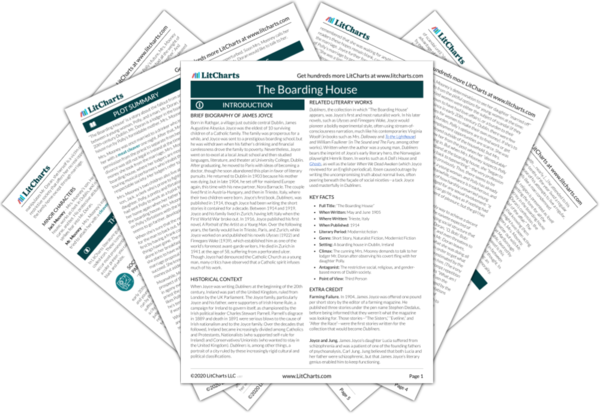Female Innocence vs. Female Cunning
Though the story’s male characters-Jack Mooney and Mr. Doran—see Polly as innocent and in need of protection, both Mrs. Mooney and her daughter in fact turn out to be the story’s most skilled social navigators. Together, they wordlessly and intuitively collaborate on a successful bid to secure a proposal from Mr. Doran. Their cunning lies precisely in impersonating female innocence to achieve their own ends. And yet, though they’re presented as manipulative, and…
read analysis of Female Innocence vs. Female CunningReligion, Guilt, and Sin
James Joyce was raised a Roman Catholic but left the church as a young man, objecting to Catholicism’s oppression of individuality and the overall effect this had on Irish society. “The Boarding House” offers a scathing critique of religion in Dublin, presenting it as, by turns, a prison (its machinery of guilt and sin trapping Mr. Doran in marriage) and a charade (as demonstrated by the worshippers in the “little circus” in front of the…
read analysis of Religion, Guilt, and Sin








Social Manipulation vs. Social Paralysis
“The Boarding House” depicts the consequences of an affair between a man and a young woman in early 20th-century Dublin. The flirtation between Mr. Doran and young Polly Mooney takes place in the house he boards in, run by Polly’s mother, the formidable Mrs. Mooney. It’s a suffocating environment that serves as a microcosm of Dublin, a city in which “everyone knows everyone else’s business”—and judges that business according to strict social mores and…
read analysis of Social Manipulation vs. Social Paralysis